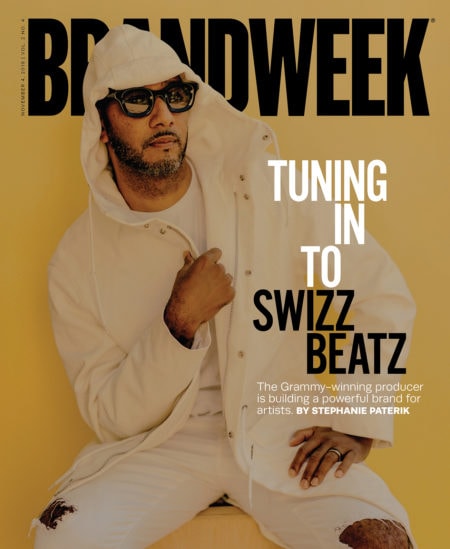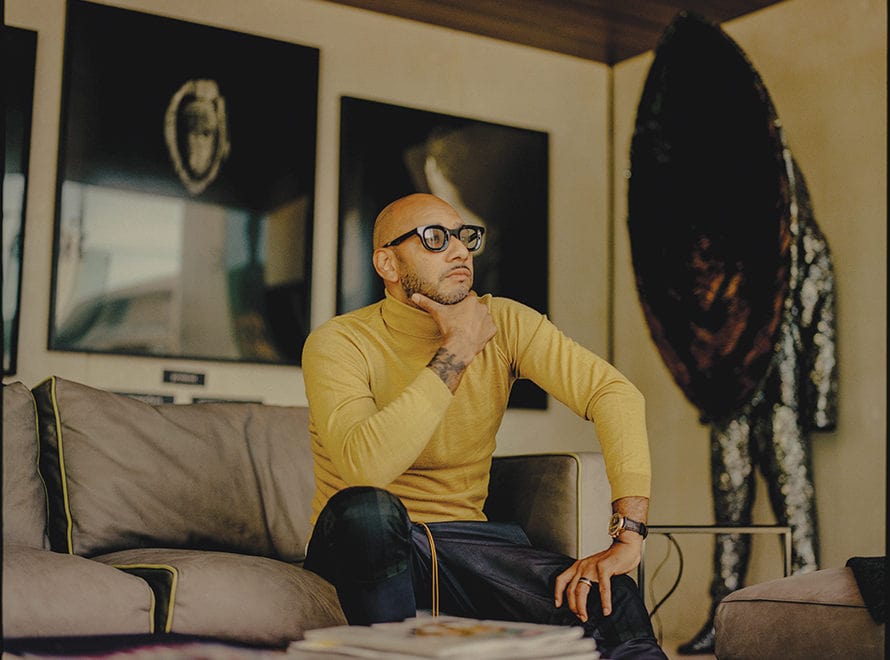Kasseem “Swizz Beatz” Dean is sitting in his favorite spot in the house, the left corner of a soft gray sofa, flanked by a bronze Nick Cave sculpture covered in buttons. Behind him is a black-and-white photo triptych conjuring the past, present and future. In another room, his wife, the singer Alicia Keys, trades “I love yous” with their 4-year-old son as the midday California light streams in.
The present seems pretty perfect. But today, Dean is taking a moment to reflect on the past and share his dreams for the future.
After growing up in the Bronx, working for his family’s record label in Atlanta and making a name for himself as one of the most prolific record producers of our time—working with artists such as Beyoncé, Jay-Z and Kanye West and releasing two of his own studio albums—he did something unexpected: Dean went back to school. At Harvard University’s Owner/President Management Program in 2015, the avid art collector hatched a business plan designed to put more money and power in artists’ hands.

He founded his business the Dean Collection and launched No Commission as an art fair in Miami, sponsored by Bacardi, with proceeds going directly to the artists—bucking the longstanding trend of galleries taking as much as a 50% cut. With free drinks and music and affordable art, the experience hooked a young crowd of art buyers and spread to New York, Berlin, London and Shanghai. He’s now working on the Smart Collection, an app that will bring the art market to your phone.
This summer, Dean’s plan got grander. He and Keys purchased a $2.5 million, 110-acre campus in the tiny upstate town of Macedon, N.Y., where they intend to open Creative Land—a business school for artists, a recording studio and a gallery that will house part of the couple’s more than 1,000-piece art collection.
Adweek sat down with Dean to talk about how he discovered a love for business at 8, why he felt compelled to attend Harvard at 39, new details about the Dean Collection and how he blends art and business. He also shared sharp advice for brand marketers about working with artists. (We’ve edited the conversation for length and clarity.)
Adweek: When were you first bit by the entrepreneurial bug?
Kasseem “Swizz Beatz” Dean: When I started packing bags at C-Town [supermarket] around 7 or 8. When my grandmother was shopping, she would say, “Go help the older people.” And then before you know it, by the time she came to the counter I had about 50 bucks from people just giving me tips. And I was like, “Oh, this is 50 bucks!” To a kid in the South Bronx at the time for just packing bags, that was huge.
When you were 16, you went to work for your uncles and aunt at their record label. What did you learn from them about leadership?
My family was always big into leadership. My grandfather and my uncle, his brother, built a lot of the buildings in Harlem, a lot of the structures and a lot of the senior-citizen centers. A lot of the insurance companies. … So I always had case studies within my family, whether it was my dad being a DJ, whether it was my grandfather and uncles being businessmen, owning ice cream trucks, owning warehouses. My grandfather managed Muhammad Ali at one point. We always had the entrepreneurial spirit inside the family.

What do you see as the relationship between hip-hop and entrepreneurialism?
I wouldn’t say hip-hop and entrepreneurialism. I would say creativity and music and entrepreneurialism. I feel like all creatives have the entrepreneur spirit. They just have to find it because a lot of us are just focused on the creative so much that we don’t necessarily want to take the risk or know how to take the risk. That’s why what I do is so important and how I do it is so important, because it gives a blueprint to other musicians and artists to trust their instincts and get to the next level.
https://www.adweek.com/brand-marketing/grammy-winning-producer-swizz-beatz-on-disrupting-the-art-world-and-building-a-powerful-brand/

